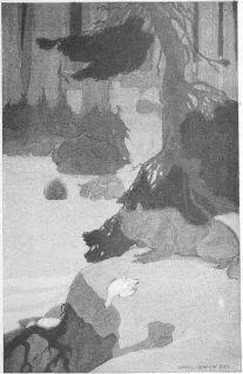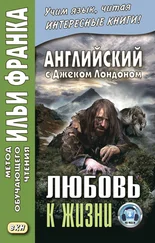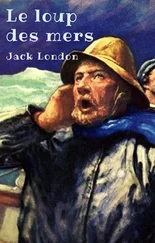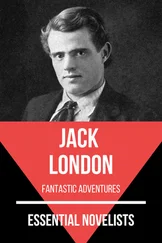Jack London - Love of Life
Здесь есть возможность читать онлайн «Jack London - Love of Life» весь текст электронной книги совершенно бесплатно (целиком полную версию без сокращений). В некоторых случаях можно слушать аудио, скачать через торрент в формате fb2 и присутствует краткое содержание. Жанр: Классическая проза, на английском языке. Описание произведения, (предисловие) а так же отзывы посетителей доступны на портале библиотеки ЛибКат.
- Название:Love of Life
- Автор:
- Жанр:
- Год:неизвестен
- ISBN:нет данных
- Рейтинг книги:4 / 5. Голосов: 1
-
Избранное:Добавить в избранное
- Отзывы:
-
Ваша оценка:
- 80
- 1
- 2
- 3
- 4
- 5
Love of Life: краткое содержание, описание и аннотация
Предлагаем к чтению аннотацию, описание, краткое содержание или предисловие (зависит от того, что написал сам автор книги «Love of Life»). Если вы не нашли необходимую информацию о книге — напишите в комментариях, мы постараемся отыскать её.
Love of Life — читать онлайн бесплатно полную книгу (весь текст) целиком
Ниже представлен текст книги, разбитый по страницам. Система сохранения места последней прочитанной страницы, позволяет с удобством читать онлайн бесплатно книгу «Love of Life», без необходимости каждый раз заново искать на чём Вы остановились. Поставьте закладку, и сможете в любой момент перейти на страницу, на которой закончили чтение.
Интервал:
Закладка:
A most unsociable dog he proved to be, resenting all their advances, refusing to let them lay hands on him, menacing them with bared fangs and bristling hair. Nevertheless he remained, sleeping and resting by the spring, and eating the food they gave him after they set it down at a safe distance and retreated. His wretched physical condition explained why he lingered; and when he had recuperated, after several days’ sojourn, he disappeared.
And this would have been the end of him, so far as Irvine and his wife were concerned, had not Irvine at that particular time been called away into the northern part of the state. Riding along on the train, near to the line between California and Oregon, he chanced to look out of the window and saw his unsociable guest sliding along the wagon road, brown and wolfish, tired yet tireless, dust-covered and soiled with two hundred miles of travel.
Now Irvine was a man of impulse, a poet. He got off the train at the next station, bought a piece of meat at a butcher shop, and captured the vagrant on the outskirts of the town. The return trip was made in the baggage car, and so Wolf came a second time to the mountain cottage. Here he was tied up for a week and made love to by the man and woman. But it was very circumspect love-making. Remote and alien as a traveller from another planet, he snarled down their soft-spoken love-words. He never barked. In all the time they had him he was never known to bark.
To win him became a problem. Irvine liked problems. He had a metal plate made, on which was stamped: Return to Walt Irvine, Glen Ellen, Sonoma County, California. This was riveted to a collar and strapped about the dog’s neck. Then he was turned loose, and promptly he disappeared. A day later came a telegram from Mendocino County. In twenty hours he had made over a hundred miles to the north, and was still going when captured.
He came back by Wells Fargo Express, was tied up three days, and was loosed on the fourth and lost. This time he gained southern Oregon before he was caught and returned. Always, as soon as he received his liberty, he fled away, and always he fled north. He was possessed of an obsession that drove him north. The homing instinct, Irvine called it, after he had expended the selling price of a sonnet in getting the animal back from northern Oregon.
Another time the brown wanderer succeeded in traversing half the length of California, all of Oregon, and most of Washington, before he was picked up and returned “Collect.” A remarkable thing was the speed with which he travelled. Fed up and rested, as soon as he was loosed he devoted all his energy to getting over the ground. On the first day’s run he was known to cover as high as a hundred and fifty miles, and after that he would average a hundred miles a day until caught. He always arrived back lean and hungry and savage, and always departed fresh and vigorous, cleaving his way northward in response to some prompting of his being that no one could understand.
But at last, after a futile year of flight, he accepted the inevitable and elected to remain at the cottage where first he had killed the rabbit and slept by the spring. Even after that, a long time elapsed before the man and woman succeeded in patting him. It was a great victory, for they alone were allowed to put hands on him. He was fastidiously exclusive, and no guest at the cottage ever succeeded in making up to him. A low growl greeted such approach; if any one had the hardihood to come nearer, the lips lifted, the naked fangs appeared, and the growl became a snarl-a snarl so terrible and malignant that it awed the stoutest of them, as it likewise awed the farmers’ dogs that knew ordinary dog-snarling, but had never seen wolf-snarling before.
He was without antecedents. His history began with Walt and Madge. He had come up from the south, but never a clew did they get of the owner from whom he had evidently fled. Mrs. Johnson, their nearest neighbor and the one who supplied them with milk, proclaimed him a Klondike dog. Her brother was burrowing for frozen pay-streaks in that far country, and so she constituted herself an authority on the subject.
But they did not dispute her. There were the tips of Wolf’s ears, obviously so severely frozen at some time that they would never quite heal again. Besides, he looked like the photographs of the Alaskan dogs they saw published in magazines and newspapers. They often speculated over his past, and tried to conjure up (from what they had read and heard) what his northland life had been. That the northland still drew him, they knew; for at night they sometimes heard him crying softly; and when the north wind blew and the bite of frost was in the air, a great restlessness would come upon him and he would lift a mournful lament which they knew to be the long wolf-howl. Yet he never barked. No provocation was great enough to draw from him that canine cry.
Long discussion they had, during the time of winning him, as to whose dog he was. Each claimed him, and each proclaimed loudly any expression of affection made by him. But the man had the better of it at first, chiefly because he was a man. It was patent that Wolf had had no experience with women. He did not understand women. Madge’s skirts were something he never quite accepted. The swish of them was enough to set him a-bristle with suspicion, and on a windy day she could not approach him at all.
On the other hand, it was Madge who fed him; also it was she who ruled the kitchen, and it was by her favor, and her favor alone, that he was permitted to come within that sacred precinct. It was because of these things that she bade fair to overcome the handicap of her garments. Then it was that Walt put forth special effort, making it a practice to have Wolf lie at his feet while he wrote, and, between petting and talking, losing much time from his work. Walt won in the end, and his victory was most probably due to the fact that he was a man, though Madge averred that they would have had another quarter of a mile of gurgling brook, and at least two west winds sighing through their redwoods, had Wait properly devoted his energies to song-transmutation and left Wolf alone to exercise a natural taste and an unbiassed judgment.
“It’s about time I heard from those triolets,” Walt said, after a silence of five minutes, during which they had swung steadily down the trail. “There’ll be a check at the post-office, I know, and we’ll transmute it into beautiful buckwheat flour, a gallon of maple syrup, and a new pair of overshoes for you.”
“And into beautiful milk from Mrs. Johnson’s beautiful cow,” Madge added. “To-morrow’s the first of the month, you know.”
Walt scowled unconsciously; then his face brightened, and he clapped his hand to his breast pocket.
“Never mind. I have here a nice beautiful new cow, the best milker in California.”
“When did you write it?” she demanded eagerly. Then, reproachfully, “And you never showed it to me.”
“I saved it to read to you on the way to the post-office, in a spot remarkably like this one,” he answered, indicating, with a wave of his hand, a dry log on which to sit.
A tiny stream flowed out of a dense fern-brake, slipped down a mossy-lipped stone, and ran across the path at their feet. From the valley arose the mellow song of meadow-larks, while about them, in and out, through sunshine and shadow, fluttered great yellow butterflies.
Up from below came another sound that broke in upon Walt reading softly from his manuscript. It was a crunching of heavy feet, punctuated now and again by the clattering of a displaced stone. As Walt finished and looked to his wife for approval, a man came into view around the turn of the trail. He was bare-headed and sweaty. With a handkerchief in one hand he mopped his face, while in the other hand he carried a new hat and a wilted starched collar which he had removed from his neck. He was a well-built man, and his muscles seemed on the point of bursting out of the painfully new and ready-made black clothes he wore.
Читать дальшеИнтервал:
Закладка:
Похожие книги на «Love of Life»
Представляем Вашему вниманию похожие книги на «Love of Life» списком для выбора. Мы отобрали схожую по названию и смыслу литературу в надежде предоставить читателям больше вариантов отыскать новые, интересные, ещё непрочитанные произведения.
Обсуждение, отзывы о книге «Love of Life» и просто собственные мнения читателей. Оставьте ваши комментарии, напишите, что Вы думаете о произведении, его смысле или главных героях. Укажите что конкретно понравилось, а что нет, и почему Вы так считаете.












